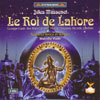Massenet (Le) Roi de Lahore
Venice restores a neglected operatic spectacular
View record and artist detailsRecord and Artist Details
Composer or Director: Jules (Emile Frédéric) Massenet
Genre:
Opera
Label: Dynamic
Magazine Review Date: 5/2006
Media Format: CD or Download
Media Runtime: 154
Mastering:
Stereo
DDD
Catalogue Number: CDS487

Tracks:
| Composition | Artist Credit |
|---|---|
| (Le) Roi de Lahore |
Jules (Emile Frédéric) Massenet, Composer
Ana María Sánchez, Sitâ, Soprano Cristina Sogmaister, Kaled, Mezzo soprano Federico Sacchi, Indra, Bass Giuseppe Gipali, Alim, Tenor Jules (Emile Frédéric) Massenet, Composer Marcello Viotti, Conductor Riccardo Zanellato, Timour, Bass Teatro La Fenice Chorus Teatro La Fenice Orchestra Vladimir Stoyanov, Scindia, Baritone |
Author: John Steane
Le roi de Lahore, a big success story in its day (and ‘big’ for once seems the right word, for it is a big five-acter, meant for big forces on the big stage of a big house), is rarely given these days. The world became aware of it again when Richard Bonynge promoted its revival with Joan Sutherland. This new production at La Fenice commemorates the opera’s first performance there in 1879. It spread like wildfire through the major theatres of Europe; it was also popular with singers, especially baritones, for the role of Scindia, however odious his character, is an enviable one, containing as it does the single aria which has survived as a well known solo for concert performances or recording.
The singer here, Vladimir Stoyanov, though not, as it happens, at his best in the aria (‘Promesse de mon avenir’), is a worthy inheritor. He has a good clear voice, apt for the French repertoire and contrasting favourably with the somewhat foggy, uneven tones of Timour, the High Priest, sung by Riccardo Zanellato. In the title-role Giuseppe Gipali drives that strong, well focused voice of his to exciting effect; and the remaining male principal, Federico Sacchi in the short but important role of the god Indra, impresses on this showing as possibly one of the best high basses in the business.
The women are not so good: Ana María Sánchez as the heroine Sitâ (in the Italian version the name was changed to Nair, apparently because the original suggested a bad smell) has a warm voice, worn in its upper register, and her attendant Kaled is unsteady. The Sutherland line-up (Tourangeau, Lima, Milnes, Ghiaurov and Morris) clearly outclasses this but the factor most decisive in its favour is the superior quality of recorded sound, especially of the orchestra and of voices in ensemble. Well as Marcello Viotti conducts the highly competent orchestra and chorus, Bonynge and the Decca recording team achieved much more satisfying results in 1977.
The singer here, Vladimir Stoyanov, though not, as it happens, at his best in the aria (‘Promesse de mon avenir’), is a worthy inheritor. He has a good clear voice, apt for the French repertoire and contrasting favourably with the somewhat foggy, uneven tones of Timour, the High Priest, sung by Riccardo Zanellato. In the title-role Giuseppe Gipali drives that strong, well focused voice of his to exciting effect; and the remaining male principal, Federico Sacchi in the short but important role of the god Indra, impresses on this showing as possibly one of the best high basses in the business.
The women are not so good: Ana María Sánchez as the heroine Sitâ (in the Italian version the name was changed to Nair, apparently because the original suggested a bad smell) has a warm voice, worn in its upper register, and her attendant Kaled is unsteady. The Sutherland line-up (Tourangeau, Lima, Milnes, Ghiaurov and Morris) clearly outclasses this but the factor most decisive in its favour is the superior quality of recorded sound, especially of the orchestra and of voices in ensemble. Well as Marcello Viotti conducts the highly competent orchestra and chorus, Bonynge and the Decca recording team achieved much more satisfying results in 1977.
Discover the world's largest classical music catalogue with Presto Music.

Gramophone Digital Club
- Digital Edition
- Digital Archive
- Reviews Database
- Full website access
From £8.75 / month
Subscribe
Gramophone Full Club
- Print Edition
- Digital Edition
- Digital Archive
- Reviews Database
- Full website access
From £11.00 / month
Subscribe
If you are a library, university or other organisation that would be interested in an institutional subscription to Gramophone please click here for further information.




